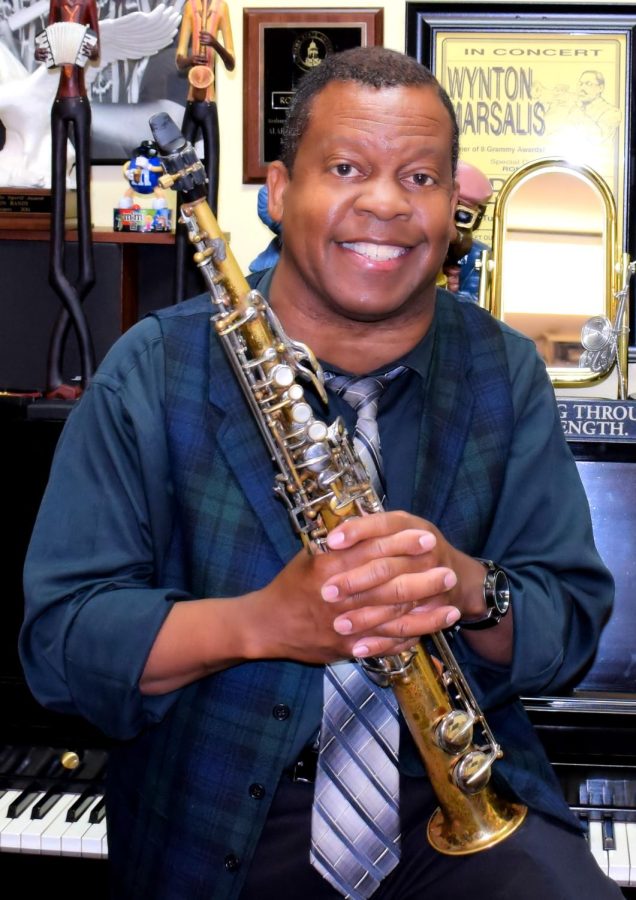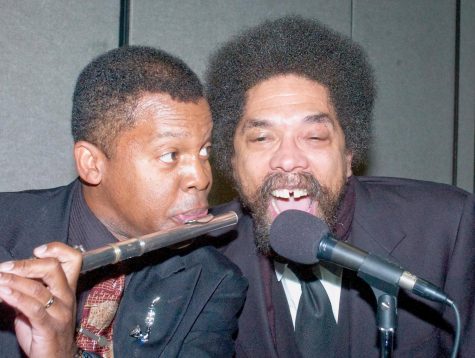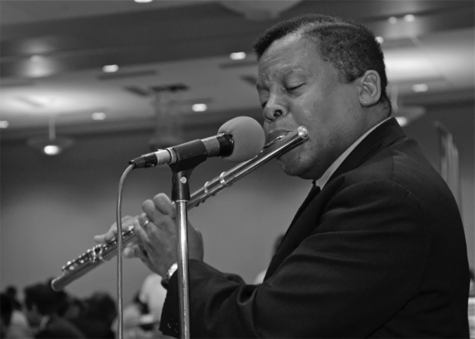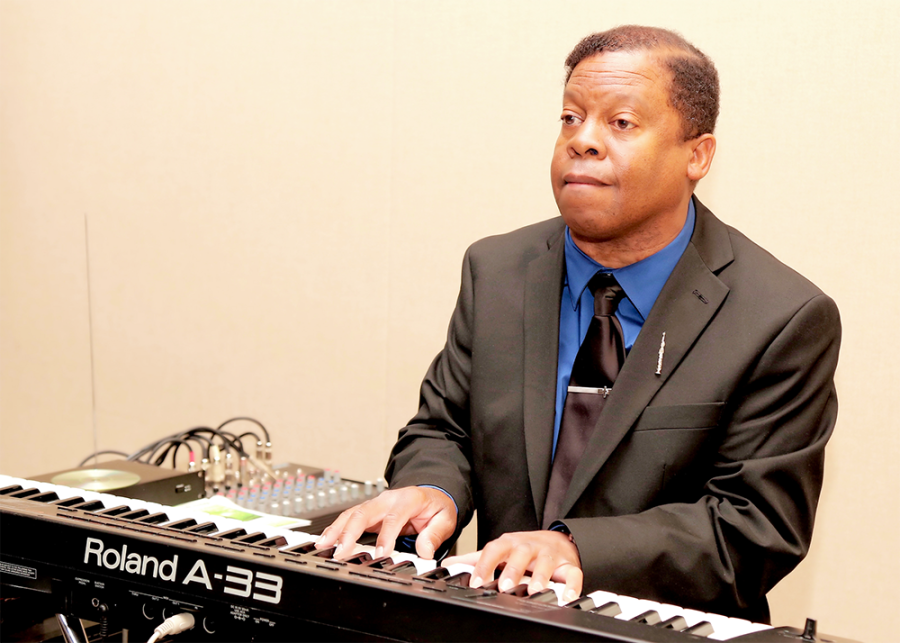Handy says ASU helped him to grow as a musician and a man
Even though talent extraordinaire Ronald Handy is employed by Alabama State University, he has been a musical force throughout the nation performing and opening for various jazz, pop, R&B and gospel stars including saxophonist Kirk Whalum, vocalist Chrisette Michele; vocalist and song writer Alicia Keys, platinum selling vocalist Avant, and jazz group Pieces of a Dream and many more.
November 27, 2021
Anyone who has had close contact with Ronald Handy at Alabama State University realizes how big of an impact that Handy has had on the lives of his students, many of whom he still keeps in contact with to this day and view him as somewhat of a father figure. The walls of his office are heavily decorated with souvenirs, gifts, portraits and loving notes that have been given to him by students whose lives he has touched with his brilliant smile, kind words, and timeless music.
“I’ve had connections to Alabama State University my entire life,” Handy said. “Throughout the years, I’ve seen all of the transitions the university has had to make, and I have watched faculty and students come and go. I’ve stayed in contact with so many students over the years and have even played at some of their weddings and family funerals. I consider these people family.”
Ronald Handy was born and raised in Montgomery, Alabama, into a multi-talented musical family. He is one of five children born to his father, Loyce Cromwell Handy, and his mother, Dorthy Handy, both graduates of Alabama State University. He recalls growing up with a close-knit bond to his father, who was a saxophone player and his mother, who played the piano in his childhood church. His siblings include his brother Cromwell, Victoria, Veronica, and Derek (all of whom attended Alabama State University as well). In addition to this, his high school sweetheart and wife Vivian Handy also completed her collegiate term at Alabama State University, along with her siblings. Handy notes that all of his siblings played instruments in their adolescent years and stated, “My father formed a band along with his six brothers, and they would play at gigs.” This colorful upbringing inspired Ronald to begin playing guitar in grade school.

Perhaps, the inherent musical talent can be accredited to their familial connection to William Christopher Handy “W.C. Handy,” a composer and musician who became known as the “Father of the Blues” due to his contribution to songwriting and publishing music in the blues form.
“My parents met here at Alabama State University, and they got married in a house on Jackson Street,” Handy explains jokingly. “It wasn’t a formal wedding, and my uncle served as the witness. All they had was a reverend, their love and a piece of cake on their wedding day. In the subsequent years, I would tease them and ask them if they were actually married because I never saw a marriage license. However, their love kept my parents married for 63 years before my father passed away. On their 50th anniversary, my siblings and I were able to throw them an actual wedding, and the reception was held in the Dunn Oliver Acadome. My mother was so excited because she had never worn a wedding dress before. She was grinning like a teenager.”
In addition to his musical interest, Handy became interested in art and basketball during his adolescent years. He explains that although he was passionate about all three of his hobbies, the music “got a hold on him and he couldn’t get enough.”
“There was always music in the home, so it just naturally progressed into something that I became interested in,” Handy notes. “A lot of people don’t know that at one point I was struggling with making a decision between pursuing music or art. I enjoyed drawing from a young age and even sketched portraits of my father as a child. In elementary school, I took an art exam and scored well on it. Basketball became something that I did every day. I played point guard in junior high school, but I didn’t quite get the growth spurt that my mom promised me over the summer. However, when I finally became old enough to join the band in junior high, it just consumed me and became my main focus.”
Handy found himself engulfed in the world of instruments and began practicing primarily on the alto saxophone almost every day. He describes the progression as being driven to learn more musically than before. Remarkably, by the time he got to high school, he was able to write musical arrangements for his school band to play, and he participated in various county and state honor bands. During high school, Ronald not only played in the marching, symphonic, and jazz bands, but he also began writing feature articles for his school newspaper.
“My high school band director, Farrell Duncombe, was an incredible man and quickly became somewhat of a second father to me,” Handy explains. “I guess he saw how dedicated I was because when band practice was over, I would stay late and practice some more. He often would tell the story of how he convinced the principal to supply me with a key to the band room so that I could go in and practice whenever I wanted to. As a result, I started competing in All-state and working on mastering my sound. We were so close that I remember him calling me into his office and saying, ‘Ronald, You like that majorette girl, don’t you?’ He convinced me to get her a card for Valentine’s Day and the rest is history because that majorette is my wife, Vivian. He even spoke at my father’s funeral. Farrell and I remained very close up until his death, and he will always be an instrumental person in my life. Ironically, he is now buried beside my father.”
After graduating from Sidney Lanier High School in Montgomery, he enrolled in college at Alabama State University with a declared major in music and an intended career path as a musical arranger/performer. When asked what drove his college decision, Handy remarks that he seemed to always be on a path to attend Alabama State University due to his family lineage. He was deeply rooted in the university, not to mention that he had a close relationship with his high school band director, who also had a strong relationship with former Mighty Marching Hornet retired band director and former School of Music dean Laurence Hayes, Ph.D.
Handy notes, “Everyone that I knew had a connection to Alabama State University, so there really was no question of where I was going to college. It was just a natural progression, but ASU was so alluring because the music department was so great.”
Once in college, Handy became hands-on with several aspects of campus life and the local community. He became a member of the Student Government Association (SGA) and the Mighty Marching Hornets. Furthermore, he continued composing arrangements for local high school bands in Montgomery. Once the custodial staff had built up enough trust in Handy, they would lock him in the building and allow him to practice his music, instructing him to leave out the emergency exit when he was done. He describes sitting in a small white practice room in Tullibody Hall until the late hours of the night, just playing his instrument and always remembering to pray that God would help him be better than the last time he practiced. After each extensive session, Handy would walk out the back door of Tullibody and walk home.
“I wanted to continue writing and composing music because I had developed quite a knack for it thanks to the help of Farrell Duncombe. Not only did it help me develop my skills, but I was getting a little money for it too, which is what you need in college. While my peers were going out and finding part-time jobs, it was really exciting to get paid for something that I loved to do because it never felt like work to me. I also started recording and doing studio work for local artists’ demos. Oddly enough, a man from the Montgomery Symphony would also come practice in Tullibody, and one day he offered me a job because I was there all the time. So from that time on, I started teaching private saxophone, clarinet, and flute lessons at a studio.”
Handy describes a pivotal moment in his life when he began to feel overwhelmed with all of the responsibility that he had been given as a musician. He recalls the time when he had a conference with Hayes in his office about why he expected Handy to play more challenging music than any of the other band members. It was at that moment that Hayes explained that he was not training Handy to be a better musician than his peers but rather preparing him to play with the same level of skill as the musicians at the Berkeley School of Music and schools alike.
With such an extensive history embedded in ASU, Handy finds it difficult to name only one memory from his tenure as a student at the university. Some notable events include “crabbing’’ the band, marching in the parades, his first halftime performance (which he stills remembers the dance routine to this day) and watching ASU beat Prairie View Agricultural and Mechanical University with a sweeping 92-0 final score.
“One of my favorite memories is when Tony Walker, Grayling Davis, Leon Parson and myself were allowed to perform various jazz scores from artists like Duke Ellington and Horace Silver,” Handy remarks. “To this day, excerpts from that performance still get played on the WVAS-FM 90.7 radio station. All of our private instructors informed us that if we were able to excel at classical music we could come back and do a jazz performance. It’s a great memory because I remember the hard work it took in order to be able to do it in the first place and afterward, my father hugged me so tightly. He was a sax player and on that particular day, and I knew he was so proud he couldn’t contain himself.”

After graduating from the university as an honor student, Alabama State University offered him a position in the School of Music. His professional career has been nothing short of amazing. In addition to connecting with students on campus, Handy was the recipient of the ASU President’s Excellence Award, and he was inducted into the Sidney Lanier High School Hall of Fame for creative musicianship and his community service efforts.
His work in the local community cannot be overlooked as Handy enjoys taking the time to visit local schools and churches to perform and speak to young people about music, life and professional development.
“The most rewarding aspect of my work has been to watch the hope for the future and to see students gaining insight as to how they can make a difference in the world,” Handy said. “Every day, I get contacted by former students who let me know how well they are doing in life, and that feels good. Along with working with colleagues who genuinely care for the development of our students, it has been amazing to see the growth of the university as a whole. ASU is a pathway to anything you want to do in life.”
Despite his humble presence, Ron has performed and opened for various jazz, pop/rhythm and blues and gospel stars, including Grammy Award-winning saxophonist Kirk Whalum; Grammy Award-winning vocalist Chrisette Michele; Grammy Award-winner Alicia Keys; Platinum-selling R&B vocalist Avant; jazz group Pieces of a Dream and many more.
As an adaptable musician with a love for different genres of music, Ron Handy has played gospel, classical, jazz and pop/R&B extensively. He has served as the musical director and/or woodwind/keyboard player for many theatrical productions such as: “The Wiz,” “Dreamgirls,” “Don’t Bother Me, I Can’t Cope,” “Purlie,” “Ain’t Misbehavin,” “The Meeting,” and many others.
Handy has been recognized on both local and national television and international radio. He has been featured on CNN, and he was the “Artist of the Week” on the international radio program “Jazz From The City,” hosted by renowned jazz DJ Ken “Spider” Webb.
Impressively, while managing all of these tasks, Handy still finds time to release his original CDs, which include smooth jazz “covers” of the R&B group Jodeci’s “Forever My Lady” and jazz vocalist Dianne Reeves’ “Come In.” He has also recorded smooth jazz versions of other pop/R&B hits, including Brian McKnight’s “The Only One For Me.” Being a spiritual person and a devout lover of God, Handy released a CD of gospel favorites titled “Sign Me Up,” which has received heavy rotation and acclaim from radio stations and listeners alike.

In response to his outstanding achievements, Handy explains, “I love life. I live a life of gratitude, and I have had the opportunity to do so many things. Every Thanksgiving, I play in the parade, and I’ve been blessed to meet with many artists such as Lionel Richie, Kirk Franklin, and even Ludacris. I am tremendously grateful for the people who poured into me here at Alabama State. Men like Dr. Hayes didn’t just teach me. They invested in me. That’s the glory of Alabama State University. It is truly a nurturing family atmosphere. ASU has given me the opportunity to grow as a musician and a man.”
Throughout the years, Handy has been blessed to perform for large and diverse audiences. His years of experience and impressive musical ability have allowed him to become one of the most sought-after musicians in the southeast. Having been given the gift of music, Handy gives glory to God and considers it a privilege and an honor to be able to share his music with the world.








Walter Carter • Aug 19, 2024 at 10:30 am
I remember my short time at ASU and Mr. Handy was always there with words of encouragement. In the band room, he was precise and a man who loved his job. He was loved by the students and was always available to teach. He made an impact on me and after all these years, if I remember anyone, it’s Mr. Handy. Live life, good sir!
Cherise Peters • Jan 15, 2022 at 6:16 pm
What a wonderful piece on this extraordinary life. Ron Handy is a living legend and I am blessed to have crossed his path.
Gracy Martin • Jan 7, 2022 at 10:03 pm
Bravo, Ron handy! I thank God for you and your testimony. You are an inspiration to me and many others.
Ron Anderson • Jan 4, 2022 at 2:47 am
Great work my brother you are an inspiration to all
Antonio Williams • Jan 3, 2022 at 1:16 pm
Ron Handy is one of the most talented musicians I know. He loves his community and is always looking for opportunities to give back. This was a great read.
Gwen Mann • Dec 28, 2021 at 5:57 pm
Ron and I took music theory together at Lanier. He has always been thoughtful and I love him dearly. I am so proud of him!
Leon • Dec 28, 2021 at 4:17 pm
Man, you’ve lived your dream!!! Every time a here a sax player. I immediately here you…I’m not talking bout local talent..I’m talking about the heavy weights….You truly are an inspiration!!!!
Steve Myers • Dec 28, 2021 at 12:00 pm
My thoughts are summed up by saying Ron Handy, Ron Handy, Ron Handy!